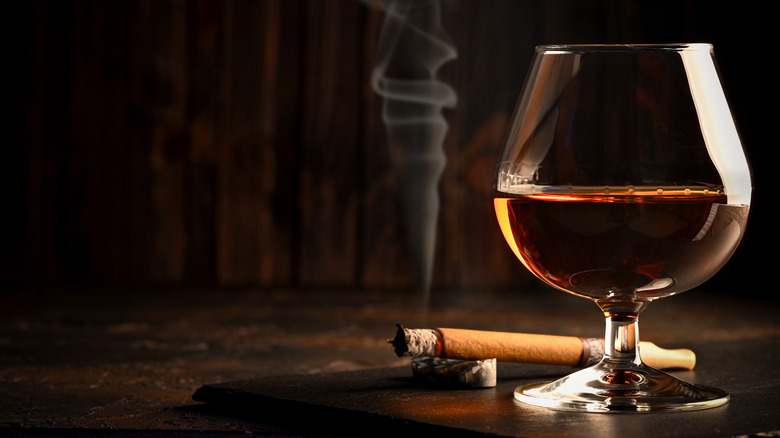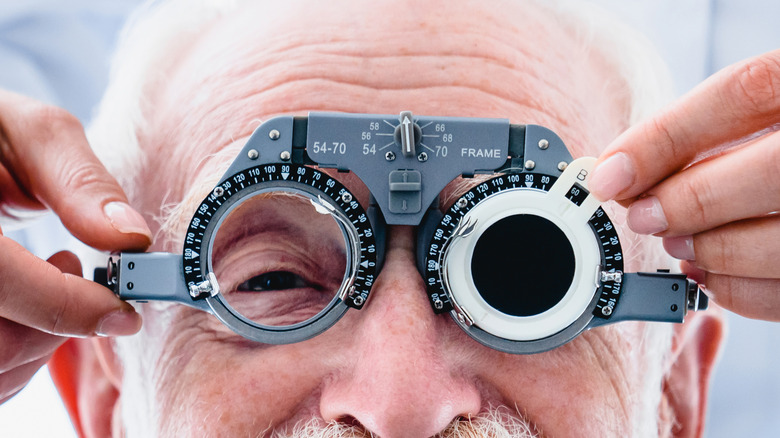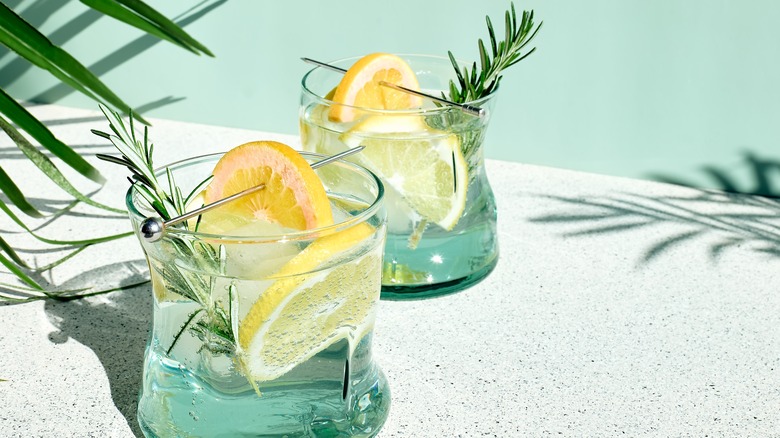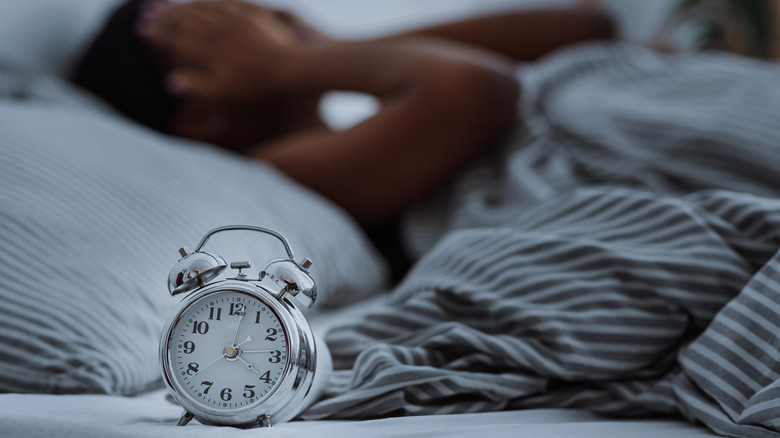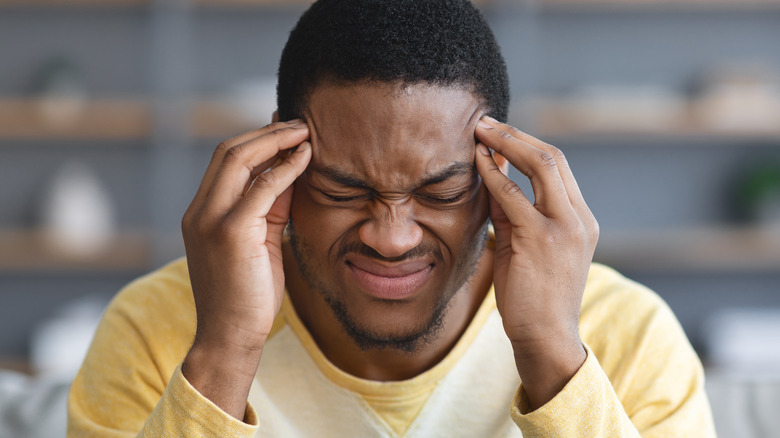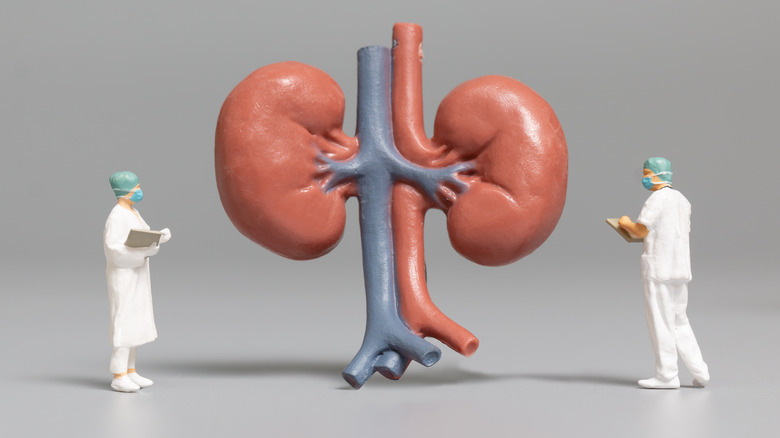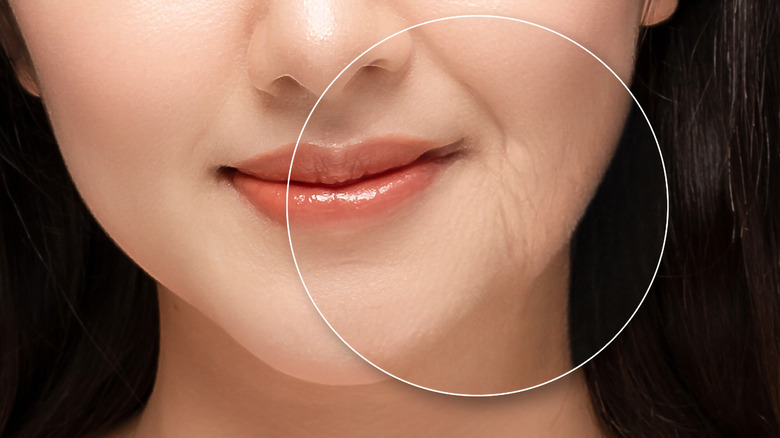What Happens To Your Body When You Drink Rum Every Night
Yo, ho, ho. It's time to get our inner pirate in full swing. Of all of the distilled spirits available on the market today, few have as strong of a seafaring identity as rum — but whether you're enjoying it on the deck of a creaking ship or on solid land, there's little denying that it's a versatile, delicious drink. And it's one that's been perfected over generations, with the history of alcoholic drinks derived from sugar cane extending all the way back to circa 350 B.C., barrelling through the ages to become the varieties of rum we know today (per The Crafty Cask).
Nowadays, you're likely to find your rum (either white, brown, or spiced) at home in a variety of cocktails, from the piña colada to the dark and stormy. But if you're a fan of a good rum-based drink, you might start to wonder (ideally while sipping on it on a warm beach) what rum does to your body when you drink it. What does rum have that other drinks don't? And is it a good idea to drink it every night? Let's take a look at what happens to your body when you drink rum every night.
Drinking rum every night may contribute to increased anxiety
We're routinely taught that drinking alcohol is meant to relax us. But if you're a fan of a rum or two every evening, you might find that relaxation turns into something a little more unsettled pretty quickly.
Using alcohol to treat anxiety and calm an anxious mind can be effective every now and again, says Healthline, likening alcohol's effects to antianxiety medications. However, the adjustments that alcohol makes to our brain chemistry and its neurotransmitters, including serotonin, can cause spikes in anxiety. This can be especially acute when your rum buzz wears off, leaving you with a greater sense of unease after drinking.
There's also the fact that drinking alcohol to excess can cause a host of consequences, like memory loss, blacking out, or health concerns, that may contribute to further anxiety. Alcohol can also contribute to increased incidences of depression, another mental health condition that may make day-to-day activity difficult. If you're experiencing anxiety or any mental health issues, it's important not to self-medicate with alcohol. Instead, discuss treatment options with your doctor. They'll be able to advise you on the best course of action, whether that's a lifestyle change or starting a course of antianxiety medication.
If you or someone you know needs help with mental health, please contact the Crisis Text Line by texting HOME to 741741, call the National Alliance on Mental Illness helpline at 1-800-950-NAMI (6264), or visit the National Institute of Mental Health website.
When you drink rum every night, your tooth health may suffer
The sweet taste of rum might be heaven for your taste buds, but the rest of your mouth may not feel the same way. And if you're drinking rum every evening, you might want to consider the long-standing impact on your tooth health.
"Drinking too much alcohol has been linked to an array of oral health problems including oral cancer, tooth decay and tooth erosion," advises The Royal College of Surgeons Faculty of Dental Surgery dean Michael Escudier to RCS England. Drinking alcohol on a regular basis can start to weaken your tooth structure by boosting your mouth's acid levels, which is exacerbated if you're mixing your drinks with something carbonated and sugary — like that rum and Coke you just poured (per NHS England).
And crucially, the more you drink, the more your teeth and oral health start to be affected indirectly. "High alcohol consumption is known to significantly increase the risk of liver disease and this has a 'knock-on' effect for dental treatment," Escudier states. When your liver is affected significantly, it limits your ability to take certain antibiotics and drugs that might be needed for dental treatment or recovery from procedures, and therefore may make caring for your teeth more complicated.
Drinking rum every day may affect your metabolism
If food is fuel for our bodies, then our metabolism is how efficient our engine is. (We've got to say, we're pretty proud of ourselves for that metaphor.) The faster our metabolism is, the quicker we burn through our food and usable energy sources — and when our metabolism is slower, it takes us longer to use up calories.
This might be useful to know for frequent rum drinkers. When we drink rum, or any alcohol, our bodies seek to metabolize it instantly, as we can't store it in our system, says Fitday. This essentially hinders our metabolic processes for the other food we eat, meaning that any proteins, carbs, or fats you consume are bumped down in the pecking order while your body deals with the alcohol. Thus, you get through these food sources slower. Drinking excessively over a longer period can also slow your metabolism generally. All of this may contribute to greater difficulty in losing weight or weight gain, says Healthline.
It's also worth remembering that the calories that you consume when you drink alcohol are nutritionally null and void. As empty calories, they won't give your body any useful nutrients, vitamins, or minerals.
Having rum every night may affect your eyes
No, we're not talking about blurry, double-vision from one too many rum punches here. Drinking rum regularly can have a pretty profound effect on your eye health, beyond everything looking a little fuzzy.
If you drink higher amounts of alcohol, over time, you might find that your peripheral vision becomes limited, leading to tunnel vision and reducing what you're able to see (via Optimax). This may create problems for day-to-day life, especially when driving or operating machinery. Drinking alcohol regularly may also increase your chances of developing age-related macular degeneration, a condition that causes vision loss in older adults, according to research published in the American Journal of Epidemiology.
It's also important not to discount the short-term effects of alcohol on vision. Crucially, drinking too much alcohol results in slower pupil reactions and lower sensitivity to contrast and general visual presentation, due to the muscles in your eyes becoming relaxed (per Verywell Health). This presents a major problem if you're attempting to operate a vehicle or perform delicate, important tasks.
If you drink rum every day, you may be consuming fewer calories than other drinks
Rum is famously made with sugar products, and this leads some people to think that it might be more calorific than other drinks (which probably isn't helped by the fact that rum is usually very much at home in utterly delicious, higher-calorie cocktails). But did you know that drinking rum every night might be a lower-cal option than other beverages out there?
For the average 1.5-ounce shot of rum, you're likely to be consuming around 97 calories, all of which come from the alcohol in the drink, says Verywell Fit. Despite rum being created from sugar, the distilling process removes any carbohydrates from the drink, so it's a carb-free beverage, with no fiber either. Rum also contains no fat and no protein.
If you compare that to the average serving of Budweiser, which contains over 10 grams of carbohydrates in a drink that's 145 calories, you can see where rum does well in the calorie stakes (per Verywell Fit). Importantly, though, spiced rum and flavored rums might be higher in calories than the average light or dark rum, due to added sugars or ingredients to give it a different taste.
Drinking rum nightly may affect your heart health
Looking after our hearts should be one of our top priorities throughout life, to ensure our ticker stays, well, ticking along healthily. But if you're drinking rum every night, you may be putting your heart health at risk by opening yourself up to a range of cardiovascular risk factors.
While low-to-moderate drinking may incur some positive effects on cardiovascular health, there is a range of negative consequences from consuming alcohol that potentially outweigh these, discusses research published in Alcohol Research: Current Reviews. One of these is to your blood pressure: While low levels of drinking might not affect blood pressure significantly, if you're prone to binge drinking, you might see your blood pressure rise into unhealthy territory.
Drinking alcohol regularly in higher quantities can also increase your susceptibility to developing coronary heart disease or experiencing a stroke. For strokes, the risk can be increased when drinking as little as two small servings of alcohol per day.
When you drink rum every day, your bones may suffer
When you think about it, our bones are everything. They are the frame, after all, that our body works from, and depends on for pretty much every function in day-to-day life. So considering our bone health in relation to our diets is paramount, and for frequent rum drinkers, it's useful to know its effects on your bones.
Importantly, while alcohol may have an effect on your bones directly, it's all of the other risk factors that come with drinking alcohol in higher quantities that may affect your bones, too. Health conditions like liver disease, pancreatitis, or diabetes all have notable consequences on bone health, Oregon State University's Skeletal Biology Laboratory research Russell T. Turner tells CreakyJoints.
Drinking alcohol also interferes with a number of normal processes in the body which serve to support bone health, making it harder to absorb vitamins and minerals that your bones need, create new bones, and create hormones that aid skeletal health. To sum it up: "The take-home message to the typical person is that alcohol abuse is bad. And whether it's a direct or indirect effect on bone, it's still a negative effect," says Turner.
Drinking rum every night may disrupt your sleep
So, it's been a long day. You're tired, but you're not that tired yet. You need something to switch off. And then a bottle of rum is glinting at you from the countertop, so temptingly ...
If that sounds like a familiar scenario, you may be well-versed in a nightly tipple of rum to send you off to sleep. But contrary to alcohol's reputation for being the best drink to make you drowsy, it may actually make your sleep worse. While alcohol may help you fall asleep faster, it can disrupt your overall sleep length and quality, particularly in the second half of the night, says Verywell Mind. Alcohol may also increase the likelihood of you experiencing symptoms of sleep apnea, where your breathing becomes irregular or interrupted in the night, causing you to wake up suddenly.
It's useful to bear in mind that these effects don't just occur when you have a drink just before you go to bed. As research published by the National Institute on Alcohol Abuse and Alcoholism shows, alcohol can impact sleep negatively, even if you stop drinking six hours before you go to sleep.
If you drink rum daily, your liver may be affected
When we drink rum, our livers kick into action. And boy, do they work hard. But over time, if you're drinking alcohol regularly, your liver may start to feel the stress, and this may lead to a host of problems.
Drinking alcohol excessively can result in a buildup of fat in your liver, known as fatty liver disease, according to Mayo Clinic Health System. This condition generally has no symptoms aside from people occasionally feeling discomfort in their abdomen on the right-hand side, and if you stop drinking early enough, your liver will usually return to normal health.
Problems occur, however, when you don't do that. If you continue to drink heavily, you're at increased risk of developing alcoholic hepatitis, where your liver swells up and your liver cells maintain damage. Along with abdomen discomfort and pain, people with alcoholic hepatitis may also have symptoms of vomiting, fever, or jaundice. The most profound form of liver damage from drinking occurs thanks to a buildup of scar tissue in the liver, called cirrhosis. Cirrhosis can then lead to a host of additional health conditions, and may even result in liver cancer or failure. The most important thing to do if you're diagnosed with any of these conditions is to consider your alcohol intake — and stop drinking.
Keep an eye on your hair and nails if you're drinking rum every night
Our diet affects every part of our bodies. And while you might not immediately notice a link between your nightly rum and your hair and nail health, trust us, it's there. When you drink alcohol, it has a dehydrating effect, and this works its way down to your nails and their structure. This leads them to "become brittle, more prone to peeling and very dry and easier to break," according to Health & Aesthetics cosmetic doctor Rekha Tailor (via Express).
Your hair and its general volume may also incur changes, depending on your amount of rum intake. "Drinking alcohol may also interfere with the absorption of protein or lead to lower protein consumption," says Tailor. When this happens, your body may then experience a protein deficiency, and this impacts your hair, resulting in hair loss or a thinner set of locks. From a cosmetic point of view, it's also useful to know that the dehydrating nature of alcohol may have an impact on your skin's health and the speed by which it ages.
Drinking rum every day will cause you to have more hangovers
Okay, look. We know that this is a no-brainer. But it's still important to point out that, if you're drinking rum regularly, your likelihood of having that familiar sore head and "why did I drink so much last night" feeling is going to be much higher.
Hangovers are caused primarily by the alcohol content of your drinks, also known as ethanol — which is technically a toxic substance, as Drink Aware discusses. The diuretic impact of the ethanol in your rum dehydrates your body significantly, and without preventative measures, this primarily causes your hangover.
And when that happens, boy, do you know. Your hangover symptoms may manifest in nausea, fatigue, an aching head, light sensitivity, or just general malaise. Crucially, though, rum probably won't cause a worse hangover, as is often assumed due to its sugar production or mixing with sugary drinks. "The body is actually really good at processing sugar, compared to alcohol, so sugar doesn't affect a hangover. It's just that sugary drinks are so much easier to drink, so you can lose track of how much you've had and push it too far," states University of Kentucky food science professor Czarena Crofcheck to Thrillist. So be careful on those rum and Cokes, folks!
Drinking rum every night may affect your kidneys
Every day, our kidneys work to keep our bodies clear of waste products, as the National Institute of Diabetes and Digestive and Kidney Diseases discusses. And when we drink alcohols like rum, our kidneys have to work even harder to move the alcohol through our system quickly (per the Cleveland Clinic). While the odd drink here and there will be easily handled by the kidneys, when you're drinking rum every night, your kidneys can become damaged — and the more you drink, the higher your chances of developing chronic kidney disease.
It's also worth bearing in mind the fact that alcohol affects multiple other parts of your body beyond your kidneys — but when it does this, your kidney health can be indirectly impacted. "The body is a big domino set. If you have one part of your body that's not in balance, it can cause problems in many other parts of the body," says kidney specialist Shane A. Bobart. More specifically, regular drinking may boost your likelihood of developing type 2 diabetes or high blood pressure, which may result in an increased risk of kidney disease. The other organs affected by frequent drinking, like your liver, may also have a knock-on effect on your kidneys if they become damaged through alcohol use.
If you drink rum daily, you might live longer
For millennia, people have been looking for the fabled Elixir of Life. Has it been rum all this time? Probably not, although if you drink rum nightly in moderation, there is interesting evidence that points towards its potential to increase your longevity.
A study published in Age and Ageing looked at the link between drinking and lifespan, and it was concluded that people who drank a very small amount of alcohol per day (between 5-15 grams) were more likely to reach 90 years old. We like the sound of those findings!
However, it's important to balance the findings of this study with the sheer wealth of knowledge about how much alcohol can limit life, in a huge number of ways. As research published in the Indian Journal of Psychiatry discusses, drinking alcohol regularly raises your likelihood of death from a huge amount of things, from diseases like cancer and cirrhosis to poisoning and accidental injury. It's also important to recognize that in the Age and Ageing study, it was asserted that participants who undertook binge drinking had a far higher likelihood of death. As such, it's important to remember that alcohol may have certain health benefits, but it also comes with an enormous amount of health risks.
You might notice a change in your skin if you drink rum every night
How's your skin feeling lately? If you're drinking rum every night, you might start to notice that it's not doing so well. As a diuretic, alcohol can cause some serious changes to your skin, both immediately and over time. "Alcohol is known to dehydrate the skin, depriving it of the moisture and nutrients it needs to keep our complexion looking radiant, supple and youthful," says cosmetic doctor Rita Rakus to Good To. Not only does alcohol cause your skin to become less elastic and increase the development of wrinkles, but it may also promote acne and pimples.
There's also an inflammatory effect that can occur when drinking alcohol, especially when we're mixing our rum with sugary drinks like Coke or fruit juices. "Sugar [in alcoholic drinks] has been shown to trigger the hormone IGF-1, which causes an overproduction of oil in your skin, increasing your chances of breakouts or acne," warns general practitioner Clare Morrison. Drinking alcohol can also trigger rosacea, an inflammatory condition that may alter skin health.




